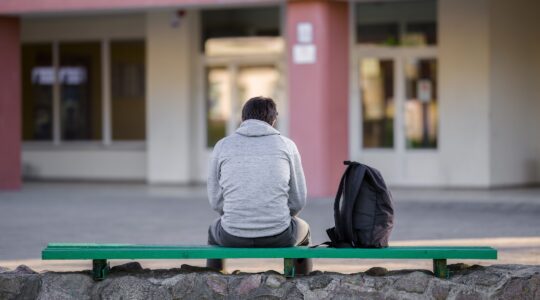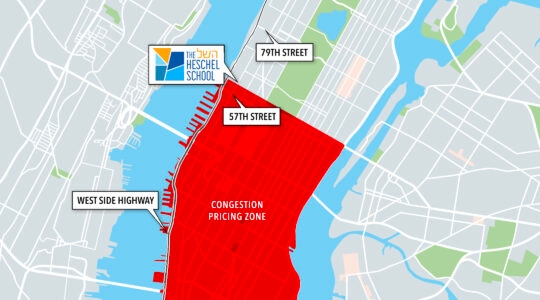It was the death threats that forced a decision.
Up to that point, Irina Nuzova says, her father Vladimir had accepted the restrictions and minor humiliations of being a Jew in Soviet and post-Soviet Russia with understandable reluctance and stoicism. He had grudgingly resigned himself to being barred from the literary institute to which he had applied, and not being permitted to travel abroad. He had shrugged off having his “nationality” listed as “Jewish.”
“My father was very natural about his [Jewishness],” the 39-year-old Nuzova says. “He would explain to me, ‘This is my nationality, and you have to know about it.’”
Today, she is a well-reviewed classical pianist whose first album, a collaborations with her frequent musical partner cellist Wendy Warner, is receiving enthusiastic reviews. She lives here with her husband and two young sons, and the former Soviet Union is a childhood memory, infrequently visited in person, if more frequently recollected.
But until January 1992, when the family left her native Moscow, it was a problematic reality.
“The real trouble began when my father [who had been trained as an engineer] chose to become a journalist,” she recalls. “He started interviewing people and publishing in Moscow newspapers.”
Among his interview subjects were Ronald Reagan’s ambassador to Russia, Jack Matlock, and Sholem Aleichem’s granddaughter Bel Kaufman, who was eloquent in her recollections of the anti-Semitism her famous ancestor had experienced. Some readers were not enthusiastic, and the death threats began.
Irina didn’t know what was happening. Already a brilliant musician, she was enrolled in the Gneissen Academy of Music, where much of the faculty and student body was also Jewish. Her kid brother, Ilya, seven years her junior, was not as lucky, although their parents tried to shield them from the dangers.
“My brother was in a regular school where the majority of the kids were ‘Russian,’” she says, meaning non-Jewish Russian. He was threatened frequently. When a journalist elsewhere in the city was shot, triggering a wave of anti-journalist violence, her father told the family, “It’s time to go,” and in January, 1992 the Nuzovas came to the U.S.
The transition wasn’t easy. Although he was a trained engineer with 20 patents to his name in Russia, and an experienced journalist, Irina’s father had no work permit. Nor did her mother, Olga Slavina, a musician and music teacher. He pumped gas and she worked in a bakery in New Jersey, an hour’s walk from their new home.
What made the difference between disaster and survival was the welcome and support the family received from Oheb Shalom Congregation in South Orange, N.J., and from two local families.
“Sheila and Edward Appel were members of the temple,” Nuzova explains. “They helped arrange my brother’s bar mitzvah, helped me get my first jobs and arranged for me to be able to practice on their Yamaha grand piano any time I needed.”
The Revesz family was from nearby Cedar Grove, its members musicians themselves, who “engaged me in endless conversations about music,” she recalls. “When I first got here I didn’t know how to obtain sheet music. They would buy music for me. They almost literally adopted us. They had us in their home for many, many seders. They got me a full scholarship to my first summer music festival, where I studied with the Emerson Quartet.”
Reflecting on what that time meant for her, Nuzova says, “When we came here, we were greeted by the Jewish community. We were surrounded by kind and giving Jewish people. It didn’t seem [to matter] what nationality you are in America. If you want to be Jewish, you’re Jewish; if you don’t want to be, you don’t. You choose to be whoever you want.”
By May of that first year in America, Nuzova was successfully auditioning for the Manhattan School of Music. Her brother got a scholarship to the Solomon Schechter School. Today he is a lawyer, while she is ascending in the ranks of classical pianists.
Her collaboration with Warner, herself a rising star, is the happy product of an act of chutzpah that Nuzova looks back on with a mixture of amusement and surprise. Looking for a musical partner, she heard Warner perform with violinist Gidon Kremer and, on impulse, she phoned the cellist cold.
“To my delight and surprise, she was very easy and came to my house,” Nuzova says. “I was highly pregnant with my first child, but we read through some repertoire and it felt so natural that we decided at the next opportunity we should play a concert.”
Six months later, they did just that. Several more concerts and the new CD followed. Now, Nuzova is a fixture on the New York classical scene, a regular contributor to such series as Concerts in the Heights, and the duo are in demand.
What about the “old country?”
Nuzova pauses, then replies, “The anti-Semitism goes in waves. Right now there’s such a strong Russian nationalism, you can always hear anti-Semitic remarks.”
Would she return?
“It will always be my native country, but after 20 years here …” She hesitates, then concludes, “I yearn to go there, but it’s painful. I don’t think it will ever be a comfortable place for Jews.”
Irina Nuzova will be performing as part of a quartet in the series Concerts in the Heights on Friday, Feb. 18, at 1 and 8 p.m., at Fort Washington Collegiate Church (West 181st Street and Fort Washington Ave.). The program will include works by Bartok, Tovey and Schumann. For information, go to www.concertsintheheights.org.
Warner/Nuzova’s new CD, “Russian Music for Cello and Piano” is available on Cedille Records.
The New York Jewish Week brings you the stories behind the headlines, keeping you connected to Jewish life in New York. Help sustain the reporting you trust by donating today.




